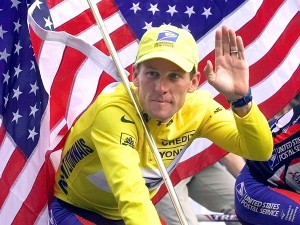
This July 23, 2000 file photo shows Tour de France winner Lance Armstrong riding down the Champs Elysees with an American flag after the 21st and final stage of the cycling race in Paris, France, Armstrong was stripped of his seven Tour de France titles and banned for life by cycling’s governing body Monday, Oct. 22, 2012, following a report from the U.S. Anti-Doping Agency that accused him of leading a massive doping program on his teams. AP FILE PHOTO/Laurent Rebours
MILAN – Credited with one of the greatest comebacks in sport, the Tour de France icon that was Lance Armstrong finished 2012 with a reputation as arguably its greatest fraud.
By the end of yet another turbulent year, Bradley Wiggins joined Australian track star Anna Meares, Sir Chris Hoy and Dutchwoman Marianne Vos in offering some cheer to a sport left in disarray by the sport’s biggest PR disaster.
Wiggins, the down-to-earth Londoner with a keen eye for music and the ‘Mod’ culture of the Sixties, followed his historic Tour de France triumph by winning Olympic time trial gold at his home Olympics.
“I cannot put it into words. I wouldn’t do it justice,” Wiggins said after adding that Olympic gold to the three had had previously won on the track for Britain.
As a federal investigation into Armstrong and his former team US Postal appeared to stall, other, more deserving champions emerged with Slovakian Peter Sagan winning three stages at the Tour de France, where he beat British sprint king Mark Cavendish to the coveted green jersey.
Cavendish, who in October was succeeded as world champion by Belgium’s Philippe Gilbert, failed in his bid for Olympic road race gold, won in stylish fashion by controversial Kazakhstan rider Alexandre Vinokourov.
Britain, however, went on to make amends by winning seven of the 10 events at the London velodrome.
Sir Chris Hoy won two from the team sprint and keirin while Victoria Pendleton ended her career by losing her sprint title to Meares.
The 36-year-old Scot cried tears of joy as he, too, waved goodbye to the Games with a sixth gold which allowed him to surpass former rower Sir Steve Redgrave’s five-gold haul to become Britain’s most successful Olympic champion.
“This is the perfect end to my Olympic career,” said Hoy.
While Wiggins stands next in line for a possible knighthood, Armstrong will go down as the cancer survivor who cheated his way to global stardom and success and was brought down without failing a dope test.
The American maintains his yellow jersey victories were won cleanly, but as the list of former teammates confessing to drug-taking and/or seeing Armstrong take drugs grew, so did the case against the American.
Finally, the United State Anti-Doping Agency (USADA) charged the American with a number of serious doping offences.
When Armstrong announced on August 24 he would not contest those charges, the USADA virtually stripped him of his seven yellow jersey titles — a decision ratified by the International Cycling Union (UCI), which also annulled all his career results since August 1, 1998.
“Lance Armstrong has no place in cycling. He deserves to be forgotten in cycling,” said UCI president Pat McQuaid.
The collateral damage since that landmark decision has been substantial.
More ex-associates of Armstrong confessed to doping, an honorary university degree bestowed on the American was rescinded, and sponsors — including sportswear giant Nike — dropped Armstrong like a hot potato.
The fall-out continued outside the American’s circle with former associates being sacked or resigning from their posts after the murky past they had hidden behind finally caught up.
Then came calls for McQuaid to resign despite his predecessor, Hein Verbruggen, holding the UCI reins during Armstrong’s reign. McQuaid remains in the sights of Greg LeMond, a former three-time champion and now the only American winner of the Tour de France.
Calling McQuaid and Verbruggen “the corrupt part of the sport,” Lemond added: “The problem for sport is not drugs but corruption. You are the epitome of the word corruption.”
LeMond has since launched a campaign to take over the UCI, a move McQuaid — who was instrumental in introducing a pioneering blood passport scheme which is widely considered an efficient deterrent to cheating — has slapped down.
“I find it a little bit arrogant for him to say he is prepared to serve as interim president of the UCI,” McQuaid said of LeMond.
“The UCI is a democracy, there is an electoral system in place.”
Whether their spat continues into next season remains to be seen. But stakeholders will be looking for guarantees there will be no repeat of an unprecedented scandal which also prompted the Dutch bank Rabobank to end its 17-year sponsorship of its pro team.
The riders, meanwhile, their achievements could be shrouded in doubt for years to come.
“We’re the ones picking up the pieces and having to convince people that the sport is clean,” said Wiggins.
“And it’s difficult to convince some people, it really is, because of a precedent that has been set.”

